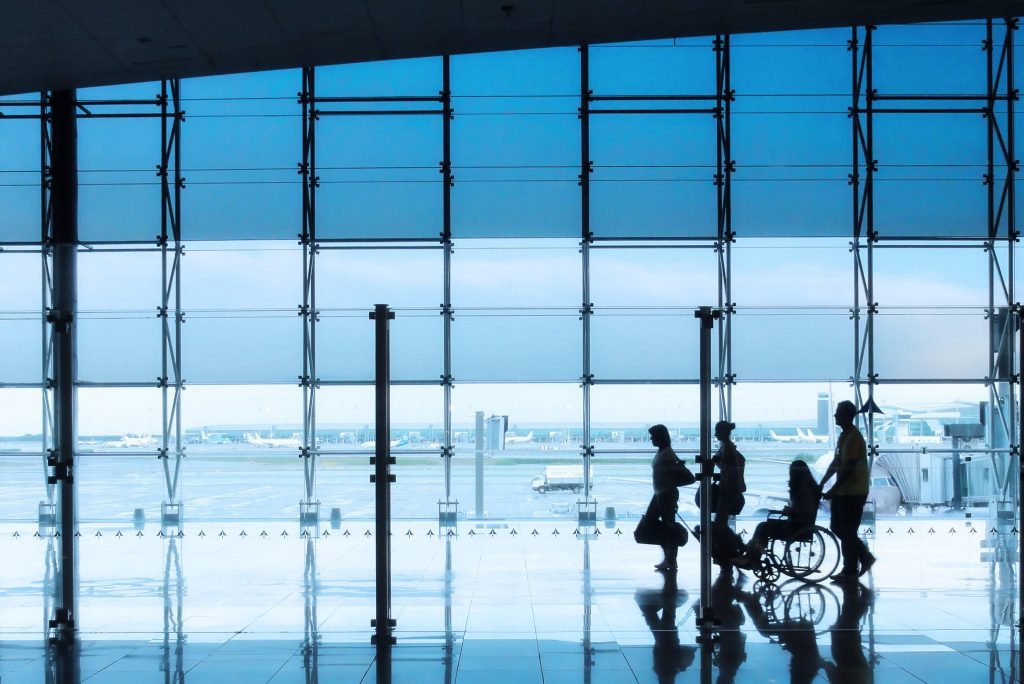Flyers With Disabilities Will Get Support From New Airlines Industry Group

Skift Take
The International Air Transport Association (IATA) is launching a worldwide action group focusing on improving and examining the safe and secure transport of mobility aids essential to accompanying travelers with disabilities.
Having previously participated in similar working groups with the Canadian
Transportation Agency and the U.S. Department of Transportation on the safe loading and security of mobility aids in the cargo, IATA is working on improving travel accessibility for the aging population and travelers with disabilities, said Linda Ristagno, IATA's manager of external affairs.
Providing access to everyone is a goal for trade group defining itself as being the business of freedom and stresses the importance of providing freedom and equal rights to everyone. Ristagno said it's also estimated to be a return on investment for airlines and aviation based on the spending power of passengers with disabilities.
American adults with disabilities spent $11 billion solely on air travel, a 2020 market study by Open Doors said.
“Every year, thousands of wheelchairs are transported safely by air. However, damage or loss is still occurring. And when it does, it is devastating to the passenger as these devices are more than equipment—they are extensions of their body and essential to their independence," said Willie Walsh, IATA's director-general.
Airlines spend millions in compensating damaged wheelchairs and scooters. Twelve hundred wheelchairs and scooters were mishandled in the U.S. in May, versus 120 damaged during the same period in 2020, the July U.S. Department of Transportation report said.
Currently, there are more than a billion people around the world or the equivalent of 15 percent of the global population living with some form of disability and those numbers are increasing dramatically due to chronic health conditions, other causes, and demographic trends, the World Health Organization (WHO) said in a fact sheet listing inaccessible transportation as one of the challenging factors.
"We acknowledge that we are not where we want to be on this as an industry. This is why we want to do something about it on a global level, not through setting up a talking shop, but by bringing the key groups together to take practical action,” said Walsh.
Differing standards and regulations across the globe create challenges for airlines, airports, and passengers.
"By its very nature, international air transport operates across multiple national jurisdictions and relies on global standards. For passengers with disabilities, different accessibility regimes in different jurisdictions can result in differing expectations and frustration. For airlines and airports, this fragmentation increases compliance complexity and costs," said Ristagno.
Since the adoption of the United Nation's convention on the rights of persons with disabilities, IATA said there has been a positive increase in levels of awareness and
policy actions surrounding disability in air transport with many regulators implementing domestic rules regarding accessible air travel.
The action group will be the first of its kind on a global scale aiming to tackle issues around securely and safely transporting mobility aids on planes, a matter of reat importance to airlines and a growing number of travelers, said an IATA spokesperson.
However in the United States, the Rehabilitation Engineering and Assistive Technology Society of North America's Assistive Technology for Air Travel, a non-profit organization known as RESNA ATAT has been working for over four years on creating standards and guidelines for publishing covering loading of wheelchairs and other assistive devices on airplanes said Michele Erwin, founder and president of All Wheels Up, the only organization in the world crash testing wheelchairs and wheelchair tie-downs for commercial flights.
RESNA ATAT, creates all of the standards for assistive devices including wheelchair wheel locking systems, said Peter Axelson, RESNA ATAT's chair and U.S. Air Force veteran with a spinal cord injury using a wheelchair for mobility.
"It is not clear how the IATA Mobility Aids Action Group plans to improve the transport journey of mobility aids. IATA and Open Doors have both been participating as members of the RESNA ATAT committee," Axelson said. "Many of the wheelchair manufacturers are already making the features in the RESNA ATAT standard available as options on their powered mobility products. IATA has the ability to adopt the RESNA standard by reference or to implement the content of the standard thru training and other mechanisms."
Having a RESNA ATAT standard that addresses the problem of damage to personal mobility devices should be of benefit to IATA, Axelson said.
"IATA already has standards and recommended practices on transport of battery powered devices and that would include mobility aids. However, we recognize that more needs to be done in this area in terms improving how these devices are handled," Ristagno said. "We believe that through collaboration with disability associations, government regulators, and associations such as RESNA, we are well-positioned to develop consistent international standards."
In a statement to Skift, IATA said it participates in activities and provides input at the request of the ATAT committee, but is not a dues-paying member.
"We aim to cover the overall journey of mobility aids and develop appropriate international instruments such as standards and training. We collaborate with RESNA and aim to continue exchanges on mutual expertise and further development," said Ristagno. "But IATA's scope is for the global industry, which is why we describe it as first of its kind."
The IATA mobility aids action group, as yet unformed will consist of a mixture of stakeholders from accessibility organizations, airlines, airports, ground service providers, and mobility aid manufacturers being impacted by this issue. IATA said it's inviting a mobility aids manufacturer to participate in an IATA task force for the first time. The task force will meet as often as necessary to review and assess the issue of safe loading and securing of mobility aids, a priority for IATA and its membership.
It will be tasked with providing recommendations and advice to stakeholders and airlines about establishing transport and handling of mobility aid policy, process, and standards advice and recommendations to airlines and other stakeholders, the spokesperson said.
“This is the beginning of a new day where the accessibility community has a seat at the table. The challenge of transporting assistive devices faces airlines across the globe and having IATA create this action group shows how committed the industry is to solve one of the largest accessibility topics,” said Eric Lipp, founder and executive director of the Open Doors Organization.
Airline trade group Airlines for America (A4A) carriers are committed to offering a high level of customer service and providing a positive flight experience for all passengers, especially those in need of additional assistance or traveling with mobility aids, said spokesperson Katherine Estep.
IATA believes that as airlines rebuild from the devastation of the pandemic, the industry is eager to build a more inclusive restart.
"Despite the Covid-19 crisis, IATA and its member airlines have worked with the accessibility community to move the priority of accessible air travel forward through several efforts. This includes developing new practical guidance to shape airline policy given new health and safety measures, and guidance for face mask policies for travelers with accessibility needs," IATA said.
Estep said A4A carriers have long been engaged in a variety of initiatives to increase air travel accessibility, including the handling of mobility aids and are looking forward to working with IATA’s Mobility Action Group as the industry continues developing best practices for mobility aid transportation, said Estep.
Making travel accessible to everyone also includes providing mask covering guidelines for passengers with disabilities unable to wear masks, an issue that came to the forefront during the pandemic.
IATA member airlines have also adopted new assistance procedures for collecting and exchanging information about additional documentation checks and mask exemptions for passengers who can’t wear a face mask onboard the aircraft.
“With aging populations in countries around the world, travelers with disabilities will be a growing customer segment for airlines. With this action group as part of the industry’s other accessibility initiatives, we want to continue on this journey to make the freedom to fly more inclusive—while continuing to work with the accessibility community every step of the way,” said IATA's Walsh.




